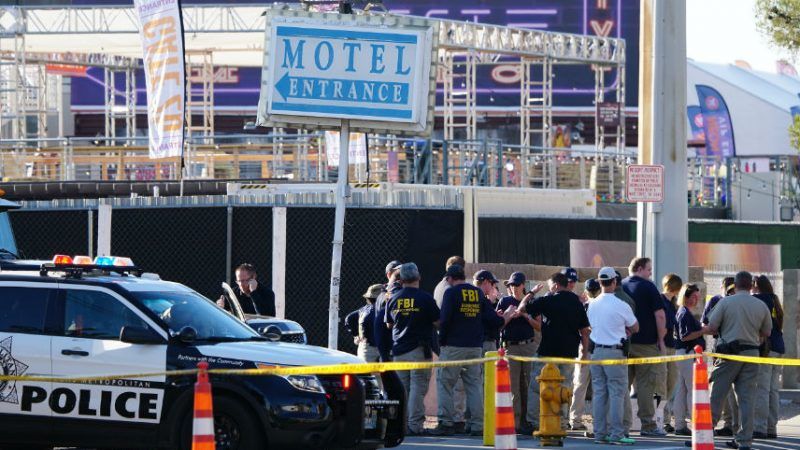Should California Deputies at the Vegas Shooting Get Worker's Comp?
Orange County denied a workers comp claim by deputies who attended the concert at Mandalay Bay and say they sustained injuries responding to it.

The Orange County deputy sheriffs' union president, in a recent interview with the Orange County Register, made a shockingly cynical statement about the men and women he represents. His words probably were meant as a rhetorical device to muscle county taxpayers into paying some controversial workers' compensation claims, but I was nonetheless floored by what Tom Dominguez was quoted saying.
"The county has to be very cautious in these cases," Dominguez told the newspaper. "If they deny the claims, then the message that they're sending to their peace officers is not to take action when it is certainly warranted."
Dominguez was referring to four unnamed county deputies who attended country singer Jason Aldean's Oct. 1 concert in Las Vegas, where a gunman murdered 59 people and injured 527 others. The deputies were on their personal time and were in Clark County, Nevada, not Orange County, California, yet they argue that California residents should pay for their physical and psychological injuries.
Orange County this week rejected the request, but it's likely to end up in court. Other counties and cities also are dealing with the same issue, according to the newspaper.
Like most government employees, Orange County deputy sheriffs receive extremely generous medical, sick leave, disability and vacation benefits. Their injuries should be covered given that they weren't at the concert for work. But these deputies seek the extra benefit of workers' compensation, which preserves their accumulated leave and allows longer periods of paid time off.
The newspaper didn't have details of the particular claims, but noted that "several Orange County deputies at the Route 91 Harvest festival quickly assumed life-saving roles—protecting the perimeter of the area with a shotgun in one case and administering medical care in other instances." When the shooting began, they used their skills to help out. They deserve to be applauded for their efforts in such a tense situation. Good for them.
The policy question, however, is whether deputies behaving as they are trained to behave opens a treasure-trove of work-related benefits—even if they were in a non-work situation in another county and neighboring state. Arguing that they are entitled to the benefits is a stretch, but let's focus mainly on what the union president had to say. He seemed to suggest that if the county doesn't agree to these extra benefits that other deputy sheriffs might not be willing to take action in a future, dangerous situation.
Am I the only one appalled by that suggestion?
Frankly, I don't believe that's so. It's rather insulting to imply that California deputies and police officers would not protect and help their fellow citizens in an emergency situation if they weren't able to later file a workers' compensation claim. Sure, union bosses press the case for every conceivable benefit. Indeed, Dominguez said he went to Las Vegas and encouraged deputies to file claims. But his statement inadvertently maligns the motives of the people he is paid to represent.
My daughter is a nurse and acts like one, even when she's off-duty. I've been on planes when doctors are called on to, well, behave like doctors. That's what makes us human. News reports about the Vegas massacre are filled with touching stories of average folks who used their abilities to assist injured people. They aided and protected their fellow concertgoers. How many of the other injured can now file workers' compensation claims for acting like menschen in the midst of a terrible tragedy?
Dominguez also said the sheriff's department expects its deputies to "take action" in these dangerous situations, whether they are on or off duty. That's commendable, especially given current case law. The California and U.S. high courts have reaffirmed what's known as the "public duty doctrine." Basically, officers have no legal duty to help anyone in particular even when they are on duty. They merely have a duty to protect the "public at large."
In this situation, that means that the officers clearly behaved as they chose to behave, not how they were required to behave. That was correct. But had they taken cover or run away, they would have been within their rights. The sheriff's department admirably expects its deputies to respond properly even off duty, but they are not legally required to do so. How can these concertgoers then demand public benefits for behaving that way?
Former San Jose Mayor Chuck Reed (D), an advocate for public-pension reform, once argued that all the pension spiking and runaway benefit costs common in the public sector led to a "corruption of the attitude of public service." It follows that a culture of gaming the system erodes the very essence of "service." Police unions speak of officers as "heroes." The work can often be dangerous, of course, but playing the workers' comp and other benefit systems undermines that ennobling concept.
Heroes endure personal danger to protect others. They would never get the message, as Dominguez said, "not to take action when it is certainly warranted" if they worry that their extra benefit claim might not be approved. I find that inference disturbing.
This column was first published in the Orange County Register.


Show Comments (60)